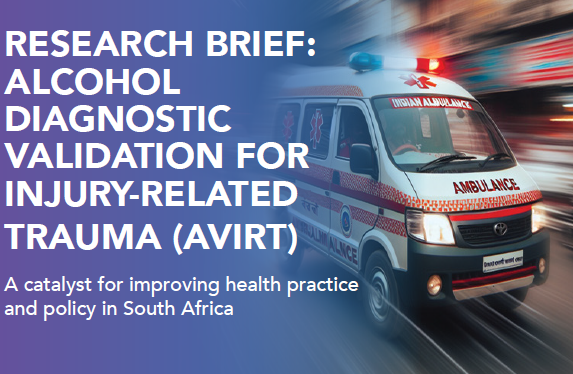On 18 March 2025, the South African Medical Research Council’s Burden of Disease Research Unit (BODRU) and Mental Health, Alcohol, Substance Use and Tobacco Research Unit (MAST-RU) hosted a briefing on the Alcohol Diagnostic Validation for Injury-Related Trauma (AVIRT) study at the Medicina campus in Cape Town. The study forms part of a collaboration with The George Institute for Global Health UK and the University of Cape Town and took place in the form of a hybrid seminar.
High rates of alcohol consumption continue to be a key driver of the high level of injury and violence-related deaths within the country. In addition, alcohol-related injuries place a significant burden on emergency healthcare professionals and services. Knowing a patient's alcohol level upon arrival at the emergency room is essential for accurate diagnosis and treatment and can be of great benefit to ensuring patient safety. This measure can also be useful in determining the burden of alcohol harm on the healthcare system and the impact of upstream policy interventions.
Opening the event was BODRU Unit Director, Prof Richard Matzopoulos, who welcomed in-person and online attendees, including researchers, representatives of the Department of Health, policymakers, NGOs, clinicians, and healthcare professionals. The Chair of the meeting was Prof Margie Peden, the Programme Director for Injury at The George Institute for Global Health UK and Co-director – World Health Organization Centre on Injury Prevention and Trauma Care.
The AVIRT study is one of several flagship projects of the SAMRC and consisted of 3 subset studies, which employed mixed-method approaches comprising both qualitative and quantitative aspects.
Sub-study 1 was presented by Co-Principal Investigator Prof Petal Peterson Williams, a Specialist Scientist at MASTRU, on the topic “To explore with qualitative research the type of alcohol information useful for different stakeholders in the trauma and injury prevention sectors.”
The 2nd sub-study entitled “To validate alcohol diagnostic tools in a clinical trauma setting” was presented by Co-Principal Investigator Dr Megan Prinsloo, a Senior Specialist Scientist at BODRU, and evaluated the usefulness of standard methods for measuring alcohol-relatedness of injury in the Emergency Room (ER) setting. These included the use of venous blood samples, to test for serum alcohol levels -also referred to as blood alcohol concentration in this study, of patients who entered the ER for first-time treatment after an injury; a patient clinical assessment through ICD-10 Y91 coding, as well as an active breathalyser (a digital reading after blowing through a mouthpiece) and passive breathalyser test (which involved a passive testing of the presence or absence of alcohol obtained by placing the device near a patient’s face). Preliminary results indicate near perfect agreement between passive and active breathalyser testing, while the study’s final analysis of the blood vs active breathalyser test is underway.
The 3rd sub-study entitled “To explore utility of the recommended alcohol diagnostic method for uptake and integration within the health system” was presented by Co-Principal Investigator Dr Carrie Brook-Sumner, a Specialist Scientist at MASTRU. This aspect of the work evaluated the experiences of health workers and managers on duty while the fieldwork nurses tested the various alcohol diagnostic tools. Participants had mixed views on the role of alcohol screening tools in clinical management, feeling that the tools could impact their practice, while others supported its use for health education in complex cases, especially in managing aggressive intoxicated patients.
The presentations were followed by rich discussions that delved deeper into the findings and potential plans for implementation going forward. Prof Charles Parry, retired SAMRC MAST-RU Director and part-time MASTRU Chief Specialist Scientist, commented on the impact of the COVID-19 pandemic. He noted that during the pandemic, there were dramatic declines in trauma admissions and unnatural deaths following the temporary liquor sales bans. This highlighted that reducing alcohol-related trauma is possible. He emphasized that ongoing monitoring of alcohol-related trauma, even if only at selected surveillance sites around the country, is essential. Prof Parry stated, "If we don’t measure it [the alcohol-related trauma burden], we won’t be able to fix it."
Recommendations for future research and policy include testing user-friendly tools at sentinel sites, as well as exploring the use of finger-prick tests to provide evidence for their validity and utility. Additionally, assessing the feasibility of implementing alcohol testing at various district and provincial hospitals will be essential in terms of developing policy guidelines and standardisation of practice. While serum or blood alcohol testing remains optimal, preliminary findings indicate that passive breathalyser testing can be implemented at a minimum, in resource-poor settings, to advocate for alcohol-policy reform and to monitor its impact.
ENGAGE-WC study
Following the seminar, the visiting TGI researchers continued their collaboration on the ENGAGE-WC study (Exploring Non-fatal Injury Data, Governance, Associated comorbidities, and Grassroots Engagement in the Western Cape), funded jointly by the SAMRC and TGI. Led by principal investigators Dr. Megan Prinsloo (SAMRC) and Dr. Dennis Mazingi (TGI), the study explores how key stakeholders—such as community leaders, NGOs, researchers, and healthcare practitioners—perceive and navigate the ethical and governance challenges surrounding data sovereignty in the context of trauma data sharing and usage in the Western Cape. As part of this effort, the ENGAGE-WC team conducted a focus group discussion and individual interviews at the Bishop Lavis Community Health Centre on Wednesday, March 19th.
Further work will include an analysis of secondary, non-fatal injury data from selected health facilities, to assess the extent of any associated comorbidities pre- and post-injury. Co-investigators to the study include Prof Richard Matzopoulos, Dr Margie Peden, Dr Rifqah Roomaney and Ms Alejandra Piragauta.
Read the Research Brief | HERE

